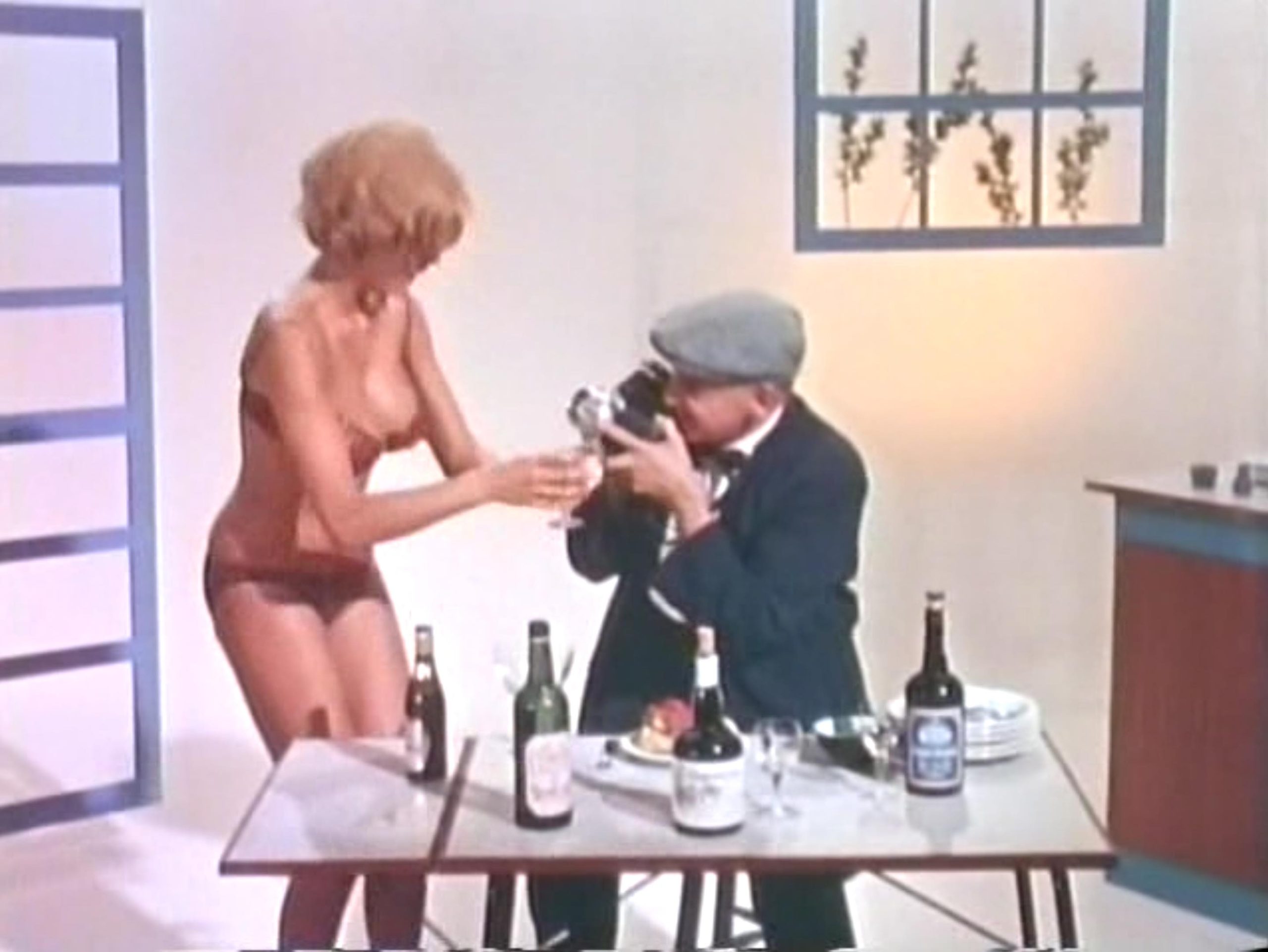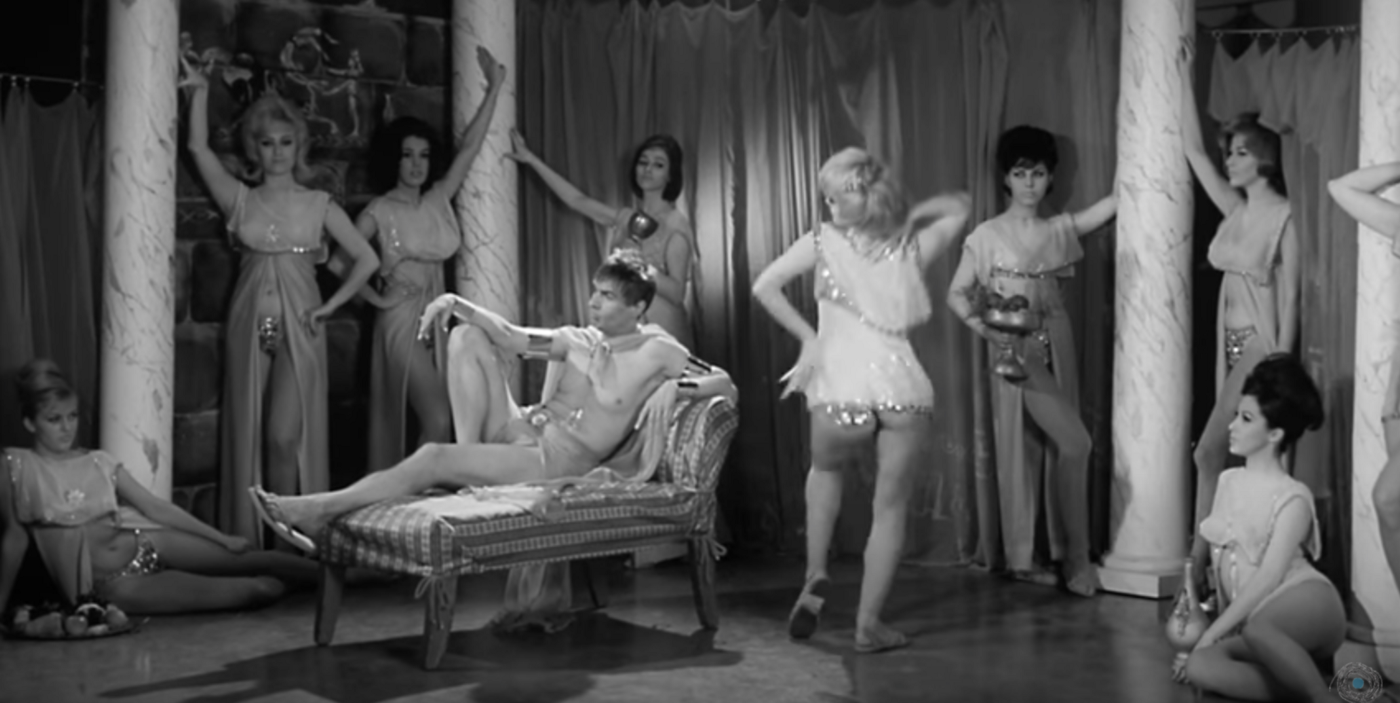
Contempt for the bourgeoisie is the driving force behind a wide range of twentieth-century art. Leslie Stevens’ Private Property is a prime example. It was released in 1960, the same year as Hitchcock’s Psycho. In fact, there is a sardonic little nod to Alfred in Private Property when the heroine, Ann, meets her antagonist, Duke. Duke pretends to be a landscaper looking for the Hitchcock family home. After Ann tells him he has the wrong house, she closes the door and repeats “Hitchcock?”, as if it has some strange significance.
Psycho was infamous for having shocked the nation. As an independent film, Private Property had a much smaller distribution, but it shocked its audiences as well. So much so that the National Legion of Decency (a Catholic organization) condemned it. Following the Christians' lead, the Motion Picture Production Code board denied the film their seal of approval. As a result, the distributor went out of business and the film was thought to be lost, but resurfaced in 2016.
Private Property revolves around the statuesque heroine played by Kate Manx. It is her repressed sexual desire that drives the film and creates an opportunity for Duke, a drifter, to slip into her carefully manicured world of quiet desperation. There are many books and movies that use this somewhat problematic premise. The fundamental idea is that female sexuality is dangerous. It is a Pandora’s box that leads to chaos.

This idea has been a theme in cinema since the beginning, with films like Georg Wilhelm Pabst’s Pandora’s Box or F. W, Murnau’s Nosferatu. Nosferatu can be seen as a story of a woman, Ellen, who is married to a sexually naive husband, Hutter. Ellen is a vulnerable target for the vampire’s machinations because she craves the heat of passion. Her passion makes her vulnerable, but conversely, gives her the strength and courage to trap and kill the vampire. She succeeds where the immature and impotent Hutter failed. This same dynamic is replayed in Private Property, but in the suburbs of Los Angeles, with a drifter instead of a vampire.
This idea of the sexually potent female can empower women, while simultaneously warning all of us that opening the door to that power will end badly. Séverine Serizy in Belle de Jour is exhilarated by the depravity of her secret profession, buteventually, she is punished. Ultimately, it is her innocent husband who pays the price. His money and affluence could not save him from the anarchic forces of his wife’s libido.

In Belle de Jour, Séverine dreams of degrading sadomasochistic encounters. Buñuel actually shows us her fantasies. Private Property is not quite as bold, but the same themes are implied. After an innocent meeting between Anne and Duke, Ann finds that Duke has forgotten his leather belt behind. She picks it up, fondles the leather, and then slips the belt around her neck, buckling it tight. It is a potent gesture, especially for 1960.

Aside from BDSM symbolism, the belt is also a symbol of ownership, like a dog collar or a slave collar. The promotional poster for the movie makes clear that the title, Private Property, is not just a reference to the materialism of the suburbs, but to Ann herself. In the poster below, it is her body that is labeled, as if it was owned. There are three men in the film, two of whom certainly treat her like a piece of property. The upstanding, socially mobile husband sees her only as a sexless decoration. It’s as if she came with the house, like a matched set of furniture. She’s a trophy that every respectable man needs.

Duke sees her only as prey to toy with, like a cat with a mouse. Duke demonstrates his potency and superiority by manipulating Ann while Duke’s buddy, Boots, watches from a window.

The only man who does not treat her like an object is Boots. He is a bit like George from Steinbeck’s Of Mice and Men. He is “slow” and simple, but not only does he have a moral compass, he also has a sense of compassion that the other two men lack.
The film is less about sex and more about power and class. Sex is just used to stir the pot. The heart of the film is watching Duke easily predict and manipulate the happy bourgeois couple. Duke becomes a kind of noir-esque critic of the American middle class. Duke explains to Boots that he can tell that the couple is married because they watch TV together.
What Duke finds contemptible about the bourgeoisie is not that they are rich, but that they have forced themselves to settle for a pacified, hollow dream. They have made a deal with the Devil. They will convince themselves that swimming pools and expensive cars are what they want, and that getting them will make them happy.
Duke sees through this pathetic bargain and sees that it is made, as Sartre would have put it, in “bad faith.” Sartre describes humanity as fundamentally afraid of our own freedom. Deep down, we know we are free to do anything we desire, but we come to realize that with this freedom comes responsibility. If we are truly free, then we are solely responsible for the nature and conditions of our lives. We are the sole author of our fate. Sartre believed that we run from this fact by acting in “bad faith”, meaning we seek ways to artificially limit ourselves and blame the false limits for making us unhappy. We attribute our malaise to a long commute, a petty boss, or a stain on our brand-new couch, instead of facing our own power and responsibility.
In Private Property, this facade is undone by the primacy of sex. The repression of polite society buckles under our animal urges. It is not just that men’s arousal is seen as uncivilized, and therefore dangerous, but that female sexuality is seen as even more potent. It is even more emotional, torrid, and unquenchable. A woman will not settle for a casual quickie before bedtime, she wants real emotional intimacy and passion. These are the true enemy of society. It is her insistence on the genuine that challenges the mollifying pall we are meant to accept as The American Dream.
In David Lynch’s Blue Velvet, Isabella Rossellini’s character stands naked in a suburban living room, like a surreal visage of sex and trauma burning a hole in the fabric of the American Dream. She is the undeniable heat seething beneath the placid surface of bourgeois propriety. She is the linchpin that threatens to bring the whole edifice down. She provokes a hungry and ultimately destructive desire in men, but her desire is even more acute. She cannot contain herself and has been driven mad by the contradictions around her.

In her autobiography, Rossellini wrote about Lynch, “Once when he was a kid, (Lynch) told me, coming home from school with his older brother, they had seen a naked woman walking down the street. The sight had not excited them, it had frightened them, and David had started to cry."
The Next Three Paragraphs Contain Spoilers
In Private Property, Ann is not ultimately undone by her passion. It is Duke who falls victim to his depraved desire. So inflamed by Ann’s sexuality, Duke loses all sense of reason and degenerates into his most base form. Typical of the 1960s, the film scrambles to right itself in the end in an effort to satisfy the censors. The bad guy is murdered by Ann’s husband, and Ann is once again placed back in her box where, having learned her lesson, she will be a good girl for the rest of her life. In Hollywood, it is necessary to always put women back in their place so that society’s mores, capitalism, and the American Dream can win out in the end.
Ann Darrow, the lithe femme fatale in King Kong, is positioned in the same way. Her sexual potency is so intense, she brings the powerful and immense Kong to his knees, and is ultimately his undoing. Then, once Kong is destroyed, she can go back to her rightful place as submissive ingenue in the arms of our civilized, white male hero.

Private Property’s director, Leslie Stevens, worked mostly as a writer for television and was best known for his work on The Outer Limits. It looks as though Private Property was his only feature film venture. He went into production with high hopes. Even with a meager budget of $59,000, Stevens managed to get A-list cinematographer Ted McCord, and it shows. There are some surprising angles and compositions that help sharpen the tension and conflict. One shot, in particular, stands out. It feels like a shot out of a Sam Fuller film, sort of arty, but gritty. While Duke tries to seduce Ann, the camera sinks low to the ground and shoots the couple dancing through a foregrounded glass of liquor. They seem to be spinning in the booze as Ann slowly loses her inhibitions.

Stevens once referred to himself as “America's only authentic New Wave filmmaker.” A stupid thing to say, for sure, but it helps to further illuminate his approach and intentions. I would place Private Property more in the noir genre, but noir and New Wave are related, as seen in films like Breathless (which also premiered in 1960). Part of the overlap is simply that Private Property was a cheap independent film, and so enjoyed a kind of freedom mainstream films did not. It was Stevens’ baby and he was able to try out creative ideas without having to worry about Paramount looking over his shoulder. Hitchcock had a terrible time getting Psycho past all the corporate hurdles and moral guard dogs.
Countless films work in this arena. I was going to mention Sam Peckinpah’s Straw Dogs (1971), Larry Cohen’s Bone (1972), Jerzy Skolimowski’s The Shout (1978), or Andrzej Zulawski’s Possession (1981), but I decided to take a quick look on Google to see what else I might find. I typed in a clumsy approximation of what I was looking for, “movies about women getting seduced”, but the top two hits were “Seductive woman movies” and “Top 10 Seductresses in Film.” Google also suggested the following films:
Weird Science
Dracula
Carrie
Betty Blue
Under the Skin
The Immaculate Room
Palm Springs
Death Becomes Her
Ghost Ship
Species
The Return of the Living Dead
Dirty Grandpa
I’m not sure what to make of the strange reversal of seduced to seducer. It would seem that women are more often positioned as seducer rather than seduced. That may not be the case at all, but something made the algorithm switch it.
Carrie is an interesting addition. She is seduced and betrayed by several of her peers. The magical powers that enable her revenge stem from her sexuality. Her powers are activated by her getting her first period, and in the end, she is triggered by a shower of blood. Once the cruelty of her middle American high school is revealed, she burns everything and everyone to the ground with the primal power of her female body.

Private Property is one among many films that grapple with the evolution and maintenance of bourgeois values. The ideology is intersectional, where all of society’s subtle and not-so-subtle forces are brought to bear. In the end, the title is a pun that enfolds sex, money, power, nature, and transcendence into an ever-changing conflict. We, the audience, watch as these forces are set against each other, and then must decide who to root for. Do we hope for the peaceful order of the American way, or do we give in to the depravity boiling underneath?

If you enjoyed this article you might also enjoy this - https://filmofileshideout.com/archives/vibrations-what-if-bergman-made-a-nudie-film/



